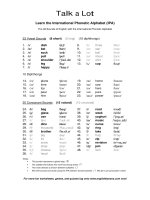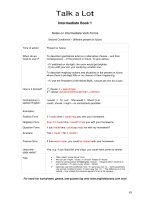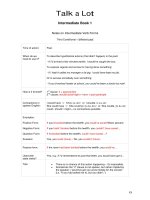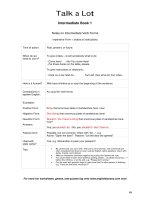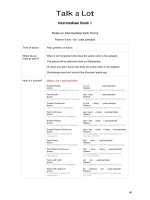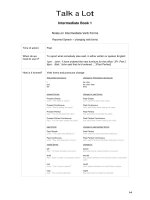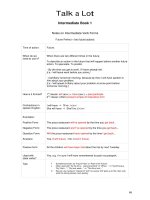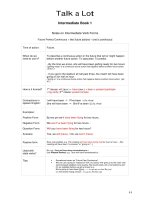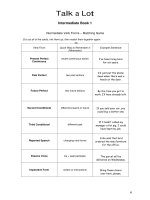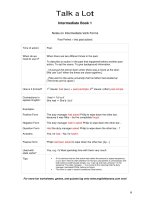talkalot intermediate book 1 future perfect
Bạn đang xem bản rút gọn của tài liệu. Xem và tải ngay bản đầy đủ của tài liệu tại đây (477.71 KB, 1 trang )
Talk a Lot
Intermediate Book 1
Notes on Intermediate Verb Forms
Future Perfect = two future actions
Time of action:
Future.
When do we
need to use it?
When there are two different times in the future.
To describe an action in the future that will happen before another future
action. To speculate. To predict.
- By the time you get to work, I’ll have already left.
[i.e. I will leave work before you arrive.]
- Call Barry tomorrow morning, because by then I will have spoken to
him about your problem.
[i.e. I will speak to Barry about your problem at some point before
tomorrow morning.]
How is it formed?
1st clause: will (aux.) + have (aux.) + past participle
2nd clause: (often) present simple or imperative form
Contractions in
spoken English:
I will have Ö I’ll’ve L]KäÉîL========
She will have Ö She’ll’ve Lp]Kä]îL=
Examples:
Positive Form:
The pizza restaurant will’ve opened by the time you get back.
Negative Form:
The pizza restaurant won’t’ve opened by the time you get back…
Question Form:
Will the pizza restaurant have opened by the time I get back…
Answers:
Yes, it will (have). / No, it won’t (have).
Passive form:
All the children will have been told about the trip by next Tuesday.
Used with
state verbs?
Yes, e.g. I’m sure I will have remembered to pack my passport.
Tips:
•
•
•
Sometimes known as “Future Past” or “Past in the Future”.
Often used with “by the time… [second action]” or “When…” or “by [time] e.g.
“By 10am…” / “By next week…” or “This time next…”
We can use “going to” instead of “will”, but using “will” gets us to the main verb
(with the strong stress) more quickly.
10
